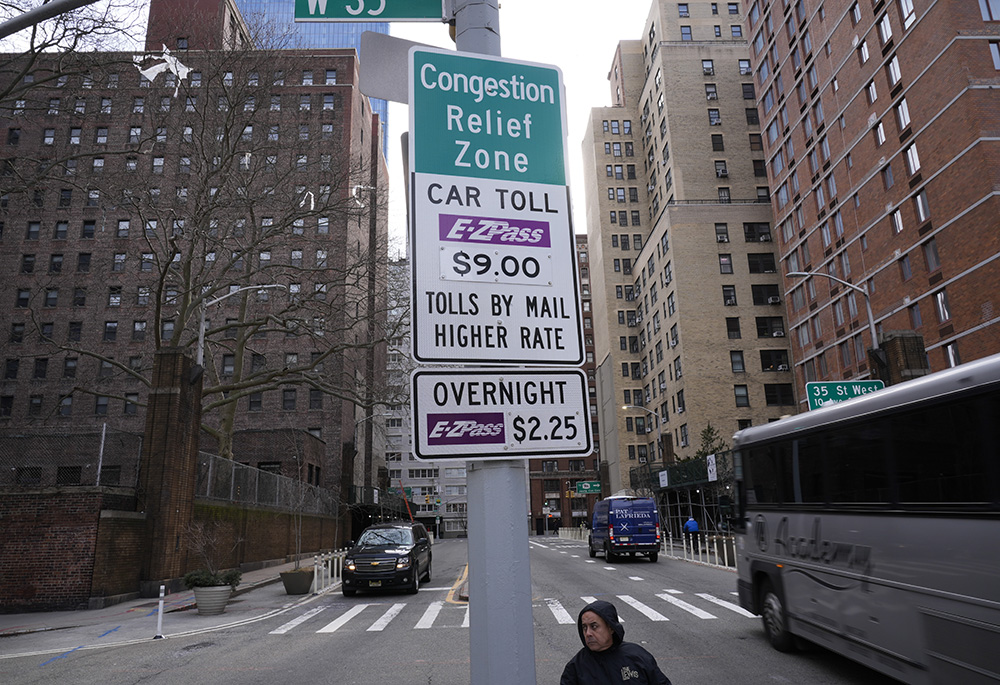
Signs advising drivers of congestion pricing tolls are displayed near the exit of the Lincoln Tunnel in New York on Feb. 19, 2025. (AP photo/Seth Wenig)
This city practically invented kvetching.
So when the state implemented congestion pricing in January, with Gov. Kathy Hochul settling on a $9 fee for drivers entering midtown Manhattan, there were complaints.
Critics argued it would prove to be another onerous tax on New York's drivers. Congestion would pile up in the Bronx, Brooklyn and Queens as motorists navigated around the hot zone. They argued that the scheme groveled to Manhattan elitists at the expense of everyone else.
Among the few not complaining, Catholics who care about the environment, including some who see the plan as operating in the spirit of Pope Francis' encyclical "Laudato Si, On Care for Our Common Home." Less traffic means lower air pollution, a plus in dealing with climate change, these Catholics say.
"NYC congestion pricing is a great example of the kind of action Pope Francis recommends," said Fr. James DiLuzio, a Paulist priest who is a member of a Manhattan parish's Laudato Si' team.
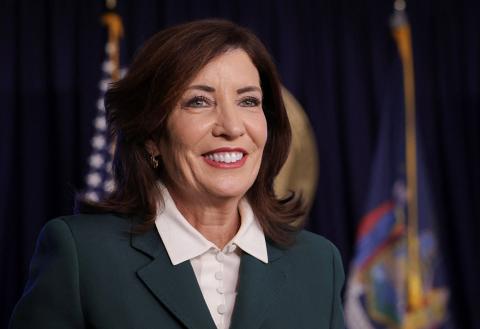
New York's Gov. Kathy Hochul is pictured Nov. 14, 2024. (OSV News/Reuters/Kent J. Edwards)
Despite the controversy, congestion pricing's initial outcomes have been largely positive. As winter chill was replaced by sizzling early summer, the plan has reduced the city's traffic logjams, while providing funds for mass transit systems used by New York commuters. Catholic environmental advocates have cheered the results.
A Regional Plan Association report published in June showed that the plan reduced traffic delays throughout the region, even in some areas not directly made part of the $9 toll zone. The study documented 25% fewer traffic jams in Manhattan than would be expected without the pricing program. There were also smaller yet significant drops in the Bronx and in parts of neighboring New Jersey.
As of May 28, congestion pricing generated $215.7 million, funds that went to the Metropolitan Transit Authority, or MTA, charged with running the regional network of subways, commuter trains and buses. The MTA said the new revenue will pay for updated signaling on segments of busy train lines, new electric buses and a subway extension into East Harlem, according to amNY.com.
"But the program still faces challenges from the federal government," amNY.com reported. "The U.S. Department of Transportation has maintained that the tolls are unlawful since there is no toll-free way to enter" the midtown zone. The Trump Administration has argued in federal court against congestion pricing.
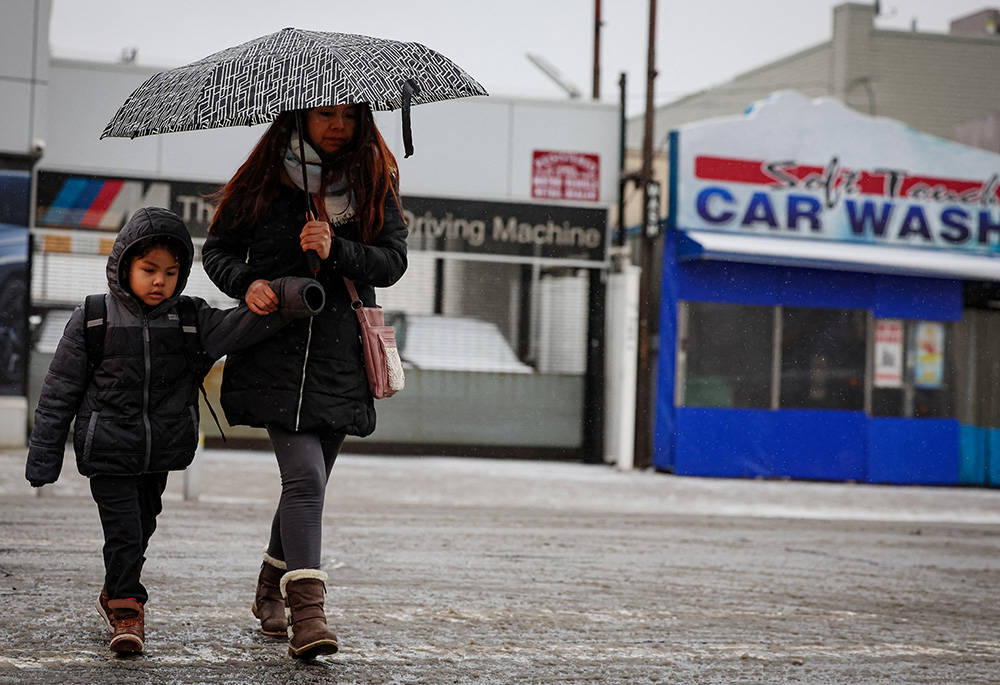
A mother and child walk to school during a morning snowfall in the Brooklyn borough of New York City, on Feb. 6, 2025. (OSV News/Reuters/Brendan McDermid)
According to The New York Times, President Donald Trump has said congestion pricing is harmful to the city's economy and has vowed to kill the program.
Trump is a native New Yorker not known as a fan of public transit.
U.S. Transportation Secretary Sean Duffy directs an agency usually known for overseeing planes, trains and automobiles. Duffy has added a populist skirmish to that portfolio.
A Catholic, the one-time reality television star has nine children, and has promised that transportation policies under the Trump Administration will direct resources toward regions where there are high birth rates and large families. Duffy is part of the administration's pro-natalist trend, seeing large families as a means to personal happiness and a response to declining birth rates.
The Department of Transportation public affairs office did not respond to National Catholic Reporter's email requesting comment.
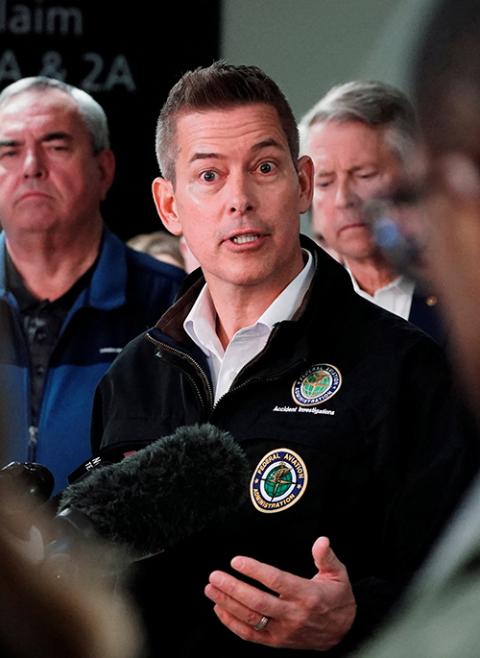
U.S. Transportation Secretary Sean Duffy speaks to the media Jan. 30, 2025, after American Eagle flight 5342 collided with a Black Hawk helicopter late Jan. 29 while it was approaching Ronald Reagan Washington National Airport to land and crashed into the Potomac River. (OSV News/Reuters/Ken Cedeno)
A memo put out by Duffy early in his term notes that his department "shall prioritize projects and goals that … give preference to communities with marriage and birth rates higher than the national average." The New York Post reported in 2023 that the state's fertility rate had declined and was below the national average.
In a February letter to Hochul, Duffy argued against congestion pricing, saying that it would impose a burden on "working class Americans” who are paying tolls they have already paid for highways through gas other taxes. "I do not believe that this is a fair deal," Duffy said.
Meanwhile, some Catholic environmentalists agree that congestion pricing is a concrete response to the late Francis' environmental vision. Yet Jamie Kralovec, professor of urban planning at Georgetown University, worries that it may fall victim to Trump administration opposition grounded in its suspicion of large liberal cities.
New York "is a blue coast city at the center of its rhetorical strategy about infrastructure and the way Democrats manage cities," Kralovec said.
Francis' environmental vision is likely to be continued by his successor, Pope Leo XIV, Kralovec said. What is known about the new pope, he said, is that Leo knows what it's like to navigate Chicago congested traffic.
In Manhattan, perhaps the greatest impact of congestion pricing on a Catholic parish involves St. Paul the Apostle, lodged adjacent to an electronic signaling device that tolls drivers going south of the West Side Manhattan church.
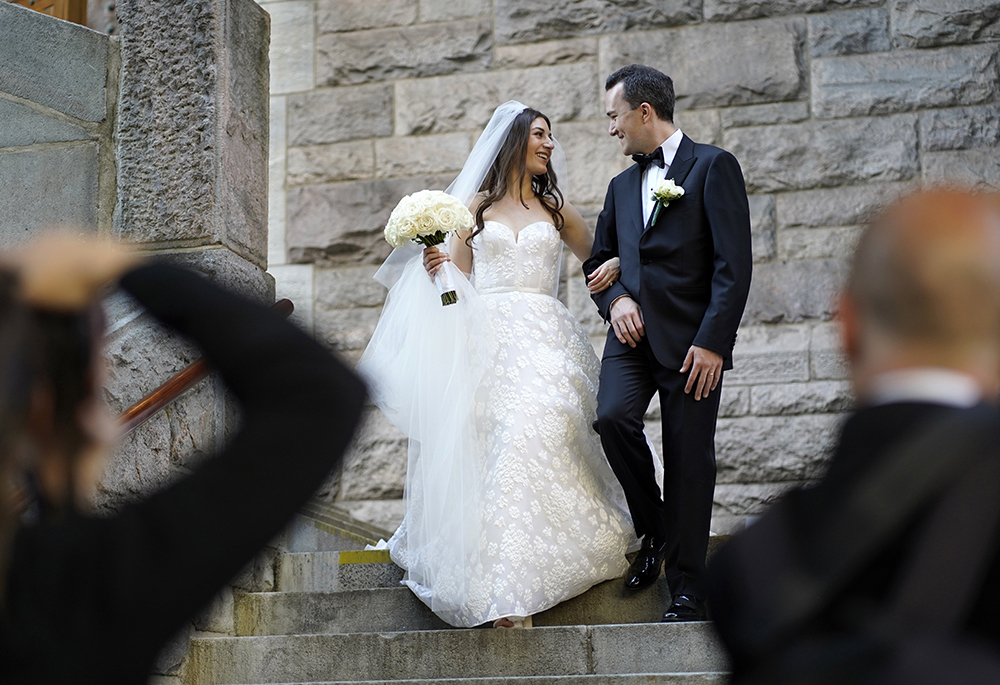
A bride and groom are seen leaving St. Paul the Apostle Church in New York City following their wedding in 2022. (OSV News/Gregory A. Shemitz)
DiLuzio, the Paulist priest, is a member of the parish's Laudato Si' team, a discussion and activism group that meets monthly to explore environmental issues from a Catholic viewpoint. The Paulist Fathers who minister in the parish generally use mass transit around the city. Yet they are sometimes hit with tolling charges when they travel to New Jersey. Still DiLuzio likes the plan.
"Mass transportation is the most affordable way to get around the boroughs for most of us and especially those with mid to low incomes. And, of course, mass transit is better for the environment."
Many Catholics remain unaware of the church's environmental teachings, he said. Others prefer to highlight economic concerns over issues of clean air and global warming.
Trump's opposition to congestion pricing is "an affront to the common good and, in many ways, to the Constitution of the USA. Canceling federal funds and subsidies for environmental care puts all the burden on states and local communities," said DiLuzio.
"As the wind will blow as it will, what can be done when the air we breathe in our city and state is impacted by the choices our neighboring states make should they prioritize business profits over health and well-being?" he said.
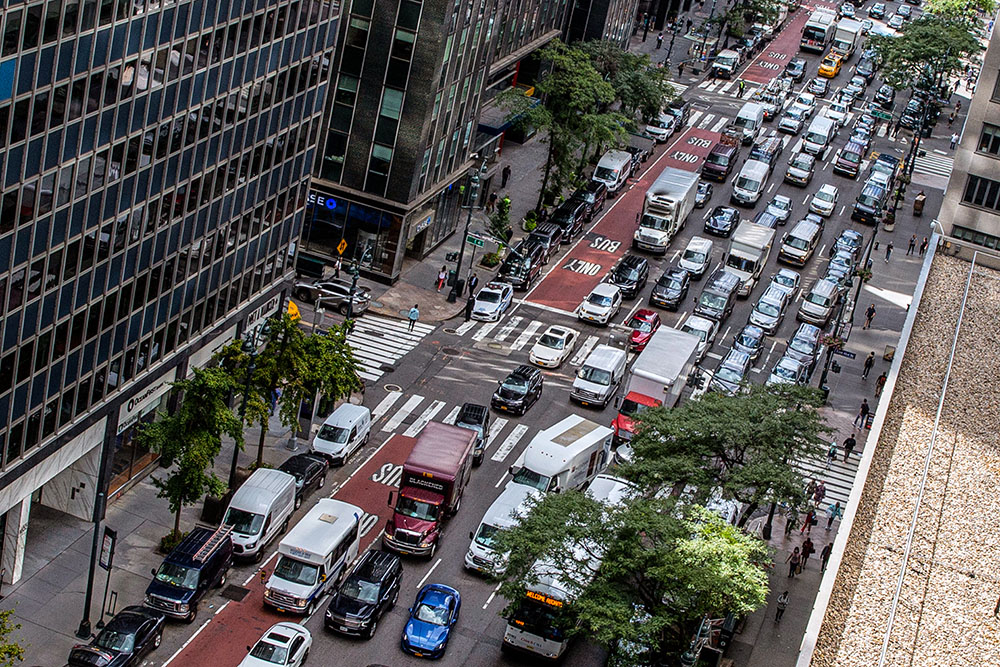
Heavy traffic fills Third Avenue in New York's Manhattan borough near the United Nations, Sept. 20, 2021. (AP/Ted Shaffrey)
St. Paul parishioner Thomas Caffery is in his 80s. He and his wife do not own a car, a trait shared by most Manhattanites. Congestion pricing, he said, is a recognition of the concept of the common good proclaimed in Catholic social teaching. As for its practical impact, he's seen improvements in crosstown buses, notoriously slow, which have been able to pick up their pace with less traffic congestion.
"The survival of public transportation is essential; so is the health effect of fewer cars and trucks," he said.
He noted that former NYC Mayor Mike Bloomberg prohibited smoking in bars and restaurants, a controversial move at the time since adopted in most locales.
"I see congestion pricing — in Manhattan, that is, the most densely packed county in the country — as a very mild form of what Bloomberg did: reducing the exhaust," said Caffery.
Advertisement
New Yorkers continue to make adjustments. As in most matters involving city life, there are lots of opinions.
Sports radio talk show commentator Boomer Esiason, former New York Jets quarterback, regularly rails against the plan. By contrast, Walt Frazier, New York Knicks announcer and former NBA great, noted while commenting during a game how congestion pricing has made his strolls around the city easier.
They come from their own perspectives: Frazier is a long-time Manhattanite. Esiason commutes to his radio gig each morning from Long Island. The kvetching is sure to continue as the federal court is expected to make its ruling by the fall.





